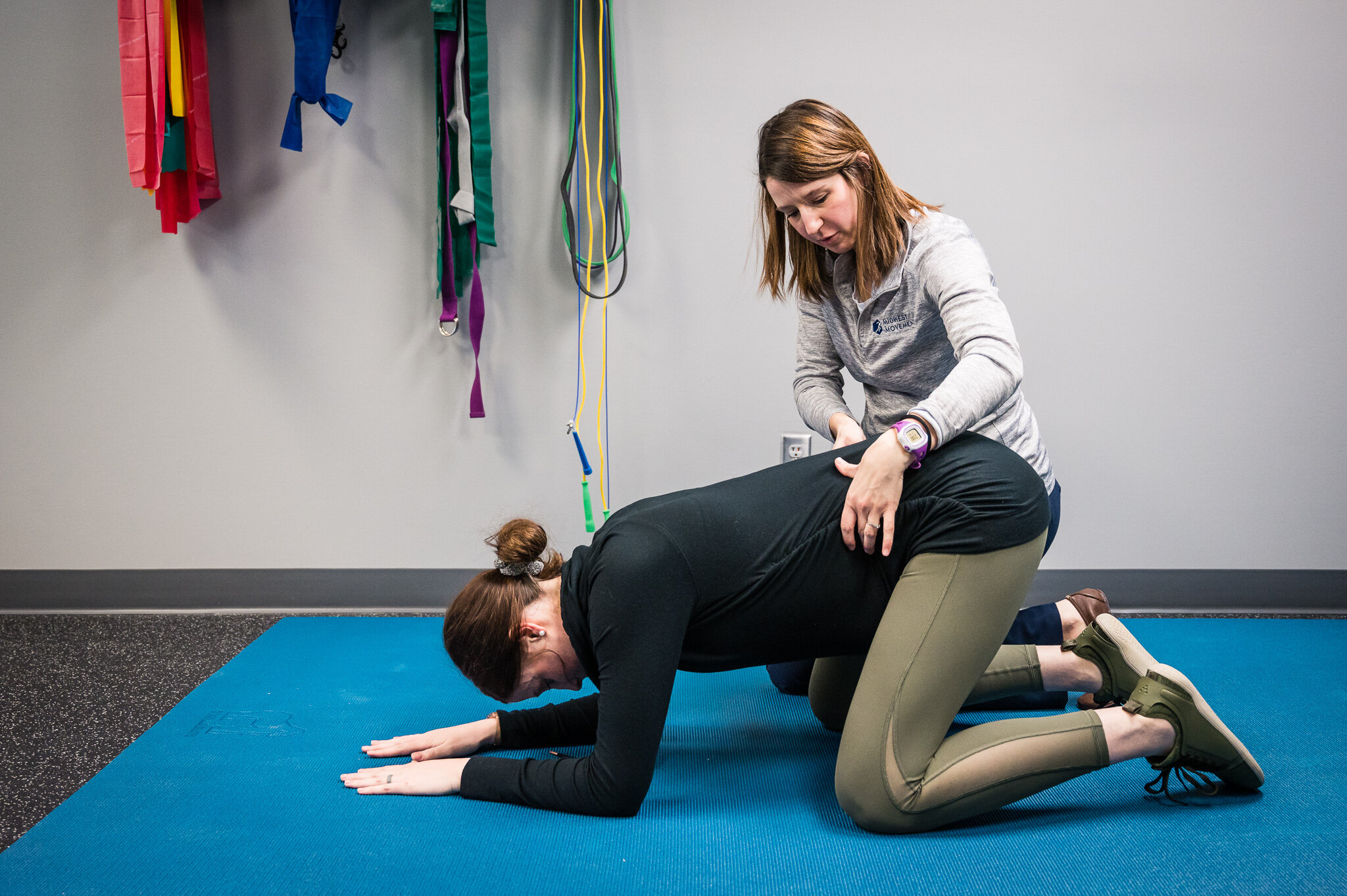Women’s Health
Pregnancy, postpartum, and beyond are full of joint and ligament changes, and we are trained to assess and correct many women’s musculoskeletal conditions to help you move the way you were meant to.
“Whitney was an absolute lifesaver during my pregnancy. She helped with all the aches and pains and was genuinely a joy to see! So many chiropractors want you to come in constantly, but [Dr. Whitney] really focuses on lifestyle changes to help you stay feeling well!”
“My labor was long, and I experienced moderate to severe pain after my delivery. It continued [for 8 months] until I saw Dr. Whitney. I could trust her as she knows what I am going through, and she is very easy to talk to. She assessed me and quickly started working on my problem areas. By the end of 8 weeks, I was pain-free, my flare-ups were gone, and my mobility was back. Thank you Midwest Movement!”
“Went and saw Dr. Whitney for a postpartum rehab! I’m so excited to get to work with such a knowledgeable person! She also is so sweet! If you are pregnant and or postpartum I would highly recommend going to see her!”
Prenatal Chiropractic
Are you expecting a little one? Congratulations! Pregnancy is an exciting time with lots of changes. A combination of chiropractic care and exercise during your pregnancy can help with low back pain, pelvic pain, pubic symphysis pain, improved sleep, incontinence, heartburn, and headaches. Chiropractic care can also help you to have a faster, safer labor and birth as well a smoother postpartum recovery!
The benefits of chiropractic care during pregnancy don’t end there. Regular chiropractic adjustments can also help your baby by creating more room in your belly and pelvis. This can help your baby get into a better position for birth.
Pregnancy chiropractic care can start as soon as you become pregnant, and you don’t have to wait until discomfort starts to begin care. Regular chiropractic care can help you stay ahead of pregnancy-related aches and pains.
Pregnancy does not mean that you’re destined to experience low back pain or any of those other problems. If you’re working through any of those issues, we have some good news: You’ve come to the right place.
Chiropractic care for pregnant women is safe, gentle, and effective, especially when paired with rehabilitative exercise. Dr. Whitney is certified in Webster Technique and is also a certified BirthFit Professional.
Webster Technique is an assessment and adjustment used by chiropractors to treat the pelvis and surrounding muscles and ligaments. Webster Technique is especially beneficial during pregnancy because it can help to optimize the pelvis in preparation for birth. When your pelvis is able to move well, especially later in pregnancy, it can help your baby get into a better position for birth — and help you move and feel better, too!
Birth may be the most athletic event of your life. What are you doing to prepare for it? Dr. Whitney can help you comfortably move through your pregnancy and safely train + prepare for birth.
Postpartum Chiropractic
While a lot of your pregnancy-related aches and pains will subside after your baby’s birth, postpartum can bring a new set of challenges. We’re here to help.
If you just birthed a baby, you are amazing. Labor and birth require some serious strength and control, and regardless of how your birth occurred, your postpartum body needs time for intentional recovery.
Your body has 9 months to slowly adapt to many biomechanical changes while pregnant — after birth, a whole new set of changes begins, and these happen all at once!
Our treatment typically focuses on mobility and relaxation during pregnancy. In the postpartum period, our approach shifts to working on gentle activation and control of the core and pelvic floor muscles.
Dr. Whitney is trained in Herman & Wallace Pelvic Rehab, she’s a certified BirthFit Professional, and she can help with a variety of common postpartum concerns like abdominal diastasis (separation), incontinence, painful intercourse, pelvic organ prolapse, pelvic tears/scars, pelvic pain, low back pain, nursing-related back pain, and more. Postpartum care can begin as soon as 1-2 weeks after birth.
Giving birth does not mean that your body is broken or damaged. Your body is strong, and you were made for this. We can help you feel like yourself again.
Core + Pelvic Floor Therapy
Dr. Whitney believes human bodies are strong, resilient, and made for movement. Her goal is to help all of her patients achieve optimal movement and function of all body systems — including the core and pelvic floor! Even though core and pelvic floor problems are common in pregnant and postpartum women, you don’t need to have children to benefit from core or pelvic floor rehabilitation.
Pelvic floor rehabilitation is performed both internally and externally, and it is safe, comfortable, and helpful for assisting with proper pelvic muscle relaxation and activation. Dr. Whitney’s pelvic floor therapy training is through Herman and Wallace Pelvic Rehabilitation Institute and the Prague School of Rehabilitation (DNS).
Some common indications that you could benefit from core and pelvic floor rehab:
Low back pain
Pelvic pain and/or pressure
Incontinence (leaking with activity or urge)
Constipation
Abdominal separation (AKA diastasis recti abdominus, DRA, abdominal diastasis)
Pain with sexual activity
Painful periods
Hip pain
Pelvic tears and scarring
Previous pregnancies, pelvic surgeries, or traumas
and more!
Even if you’ve never had children, if you have any of the symptoms listed above, focused core + pelvic floor training may help.
Beginning core + pelvic floor rehab prior to conception and during your pregnancy can help you to have a more comfortable pregnancy, a faster and safer labor and birth, and an improved postpartum recovery.








